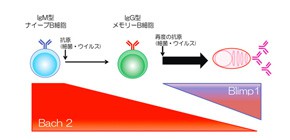
Clarification of mechanism for rapid secondary antibody response
a step forward in development of future vaccines
Under the leadership of KUROSAKI Tomohiro , Professor, Immunology Frontier Research Center (IFReC), Riken, and the Center for Integrative Medical Sciences, using experimental data obtained from mice, a group of researchers demonstrated that repression of transcription factor Bach2 predisposed non-antigen-experienced memory B cells to a more rapid and robust antibody response.
This group clarified that appropriate Bach2 expression in memory B cells is important for rapid secondary antibody response. Their results showed the critical role played by the expression level of Bach2 in determining the rapid response by memory B cells when encountering an antigen which they have experienced previously. In other words, it appears that when the expression level of Bach2 in memory B cells is inappropriate, the result is either an abnormal level of antibodies being produced resulting in an allergic or autoimmune response, or an insufficient level of antibodies resulting in a weakened response to the antigens.
Understanding how memory B cells work is very important in the development of effective vaccines for influenza and other diseases. Bach2 may play a central role in developing novel vaccines and drugs for immunity disorders.
Abstract
Memory B cells are essential for generating rapid and robust secondary antibody responses. It has been thought that the unique cytoplasmic domain of IgG causes the prompt activation of antigen-experienced IgG memory B cells. To assess this model, we have generated a mouse containing IgG1 B cells that have never encountered antigen. We found that, upon challenge, antigen-experienced IgG1 memory B cells rapidly differentiated into plasma cells, whereas nonexperienced IgG1 B cells did not, suggesting the importance of the stimulation history. In addition, our results suggest that repression of the Bach2 transcription factor, which results from antigen experience, contributes to predisposition of IgG1 memory B cells to differentiate into plasma cells.

Figure 1

Figure 2

Figure 3

Figure 4

Figure 5

Figure 6
To learn more about this research, please read the full research report entitled " Repression of the Transcription Factor Bach2 Contributes to Predisposition of IgG1 Memory B Cells toward Plasma Cell Differentiation " at this page of the Immunity website.
Related link :
